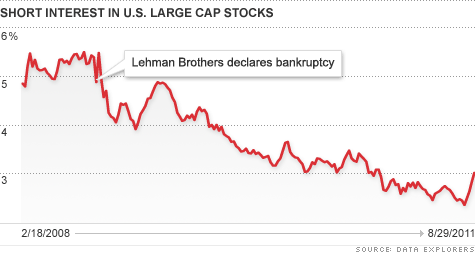Search News

Short interest has recently spiked to the highest level in nearly a year as investors seek protection from the recent market turmoil.
NEW YORK (CNNMoney) -- Summer may be nearing an end, but the bears have come out to play.
Bearish bets against the S&P 500 rose to their highest levels in almost a year last month, as the benchmark index plunged nearly 18% from its April highs.
| web |
The level of short interest in the S&P 500 (SPX) spiked to 3.03% at the end of August, according Data Explorers, a New York-based research firm that tracks short sales. At the start of the month, the level stood at 2.37%.
When investors "short" a stock, they borrow shares and quickly sell them with the hopes of buying them back later at a lower price.
"Increased uncertainties related to the budget process, the economic recovery and the European debt crisis" are a big reason why investors are wagering that stocks will continue to drop, said Todd Salamone, senior vice president at Schaeffer's Investment Research.
Washington's ugly debate over raising the debt ceiling followed by Standard and Poor's credit downgrade at the start of August left a bad taste in investors' mouths.
The events acted as the catalyst for extreme volatility and a bruising sell-off in stocks, as investors also grappled with fears the U.S. economy would fall back into a recession and Europe's debt problems would spiral out of control.
None of those issues have been resolved.
"It almost goes without saying that short sellers have had a tough time making money during the last few years of the bull market," said Salamone. "But the landscape is changing, and they aren't feeling pressure at all right now."
During all of the recent market turmoil, stocks have dropped into negative territory for the year and below key technical levels that tend to support the market. Those trends typically favor short sellers, Salamone.
On top of that, negative sentiment among hedge fund managers is at its highest level in a year, according to the TrimTabs/BarclayHedge latest monthly survey. About half of the 86 hedge fund managers surveyed said they don't think the government will be able to agree on a deficit package, and 56% said they think the economy is already in a recession or will enter one soon.
Ryan Bend, a portfolio manager of the Federated Prudent Bear Fund (BEARX), has been bulking up the short positions in his fund recently, which range anywhere from 70% to 100% of the portfolio . For the first half of the year, the fund's short exposure was around 80%. By the end of July, the most recent data available, Bend boosted that to more than 90%.
"We're always looking for signals that confirm the bear thesis, and if we see a lot of them, we increase our short exposure," Bend said. "We've been running on cylinder for several weeks, and from our perspective, the fund is well positioned."
During August, the bear fund booked its best returns in a year, nearing 5%. The biggest wagers were placed against technology, financial and consumer discretionary stocks.
The consumer discretionary sector is picking up the greatest amount of short interest, with an average of more than 4% of total shares out on loan, according to research from Data Explorers.
GameStop (GME, Fortune 500) is the most shorted stock in the S&P 500, as investors worry about the video game retailer's slashed profit forecast and its struggles with declining store traffic amid increased competition from the digital world.
Department store chain JC Penney (JCP, Fortune 500) is also a highly shorted stock, as is Netflix (NFLX), whose stock has jumped 20% from the start of the year.
Other big names favored by short sellers include U.S. Steel (X, Fortune 500) and Pitney Bowes (PBI, Fortune 500).
As long as investors continue to doubt the strength of the economic recovery, Washington's ability to reach a compromise on the nation's deficit, and Europe's control over its money troubles, short interest is likely to keep rising.
"Investors are looking for some clarity, and until they get that, they'll stay cautious and protect themselves by short selling." said Nathan Rowader, director of investments at Forward Management.
But short selling activity probably won't near the peaks of the 2008-2009 bear market panic.
"They're just using short positions to take away some of the risk off the table," Rowader said. "Investors are unwilling to keep selling because stocks are still attractive in an environment where the Federal Reserve has intervened and valuations are as low as they are." ![]()
| Index | Last | Change | % Change |
|---|---|---|---|
| Dow | 32,627.97 | -234.33 | -0.71% |
| Nasdaq | 13,215.24 | 99.07 | 0.76% |
| S&P 500 | 3,913.10 | -2.36 | -0.06% |
| Treasuries | 1.73 | 0.00 | 0.12% |
| Company | Price | Change | % Change |
|---|---|---|---|
| Ford Motor Co | 8.29 | 0.05 | 0.61% |
| Advanced Micro Devic... | 54.59 | 0.70 | 1.30% |
| Cisco Systems Inc | 47.49 | -2.44 | -4.89% |
| General Electric Co | 13.00 | -0.16 | -1.22% |
| Kraft Heinz Co | 27.84 | -2.20 | -7.32% |
| Overnight Avg Rate | Latest | Change | Last Week |
|---|---|---|---|
| 30 yr fixed | 3.80% | 3.88% | |
| 15 yr fixed | 3.20% | 3.23% | |
| 5/1 ARM | 3.84% | 3.88% | |
| 30 yr refi | 3.82% | 3.93% | |
| 15 yr refi | 3.20% | 3.23% |
Today's featured rates: